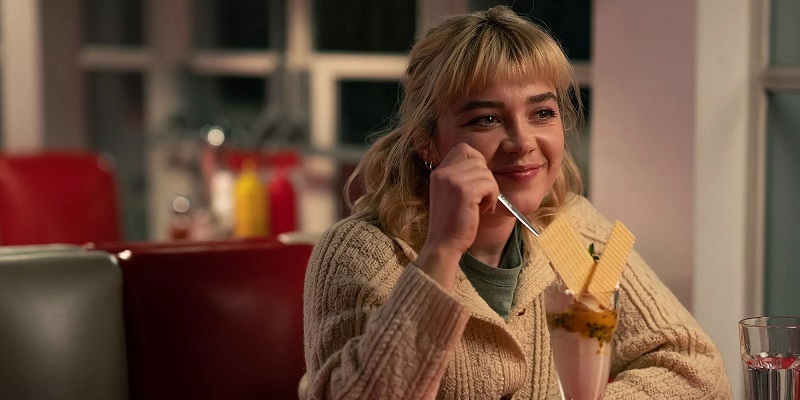
Review by
Eric Hillis
Directed by: John Crowley
Starring: Andrew Garfield, Florence Pugh, Grace Delaney, Lee Braithwaite, Aoife Hinds, Adam James, Douglas Hodge, Niamh
Cusack

Back in the days before digital projection you would hear stories of
arthouse movies being played with their reels out of order and audiences
failing to realise the projectionist's mistake. If director John Crowley and writer Nick Payne's romantic drama We Live in Time were accidentally played out of order an audience might struggle to
notice. Crowley and Payne have chosen to tell this rather conventional
romance in non-linear fashion. As with the troubled couples played by
Audrey Hepburn and Albert Finney in Two for the Road and Ryan Gosling and Michelle Williams in Blue Valentine, the story of the relationship between Tobias (Andrew Garfield)
and Almut (Florence Pugh) is told through a series of flashbacks.
The difference here is that the flashbacks are presented in what feels
like an arbitrary and often confusing order.

We Live in Time is built around that classic tearjerker trope - the terminal diagnosis.
After previously beating ovarian cancer, chef and restaurant owner Almut
is informed that the disease has returned. She wants to forego what she
sees as futile treatment and concentrate on making the most of her limited
remaining time by representing the UK in an international culinary
contest. Her partner Tobias wants her to take the treatment, as he's
desperate not to be left alone with their young daughter Ella (Grace Delaney).
From this point the movie flips forwards but mostly backwards as we see
how Almut and Tobias initially met, their subsequent romance and the ups
and downs that follow. The structure means that we spend too much time
trying to figure out where in the timeline we are at any given point when
we should be invested in the unfolding drama. Almut's shaved head lets us
know we're watching scenes that occur after her second diagnosis, but save
for Almut's pregnant tummy there are no such visual signifiers to guide us
through the scenes set prior to that point. There's a revelation late on
that fell flat for me because I had wrongly assumed a character was
already aware of some specifics, having mistaken the timing of a certain
flashback.

Many of the scenes are so short that by the time we've worked out where
they fall on the timeline we're on to the next flashback. Such brevity is
indicative of a film that is only superficially interested in its story
and characters. The movie's scenario tangentially raises some big
questions about what it means to be alive and the responsibilities of
being a parent, but the movie never tackles them in any depth. The film
would be easier to swallow were it not complicated by the presence of a
child, with poor young Ella something of an afterthought here rather than
the most important person in all of this, as she would be in any realistic
scenario. While we can understand Almut's desire to leave some sort of
legacy by winning the culinary contest, it's difficult to buy the lack of
interest she takes in leaving a memory for her daughter to carry on. There
are practically no scenes of Almut spending time with Ella, but we can't
tell if we're supposed to view her as an inattentive mother or if Crowley
and Payne simply didn't think such moments were important (a baffling
decision if so).
The various relationship markers we see fall somewhere between Richard
Curtis and Coronation Street in their attempts to create contrived drama from everyday
situations. The impromptu birth of Ella in a service station is straight
out of a soap opera, and Almut and Tobias's meet cute is so over the top
it belongs in a far less grounded movie. Throughout all this we get a
distracting amount of product placement. Tobias works for Weetabix;
various brand name confectionary packets are held up so the light catches
their distinctive packaging; and in the most brazen scene the delivery of
some terrible news is softened by a character producing a tub of Cadbury's
Celebrations - the entire scene plays like a commercial.

And yet for all its troubles there are moments in We Live in Time that may well have you reaching for a tissue. Even if we don't
entirely believe the situations Almut and Tobias find themselves in, the
palpable chemistry between Pugh and Garfield leaves us in no doubt that
these two people belong together. Channelling a young Tom Hanks,
Garfield is especially effective at tugging the heart
strings, Tobias's face constantly bearing the weight of trying to stay strong
for his family when all he wants to do is break down in tears. The
cherubic Pugh is arguably miscast in a role that requires her to play a
woman on the verge of 40 for much of her screen time, but she's so
charismatic we give her a pass. Garfield and Pugh are so good that it
only makes the disastrous non-linear narrative all the more frustrating.
The movie bullies us into sympathising with Almut and Tobias by opening
with the former's diagnosis rather than letting the characters earn our
empathy; as embodied by Garfield and Pugh, I think they would
have.

We Live in Time is on UK/ROI
VOD now.

